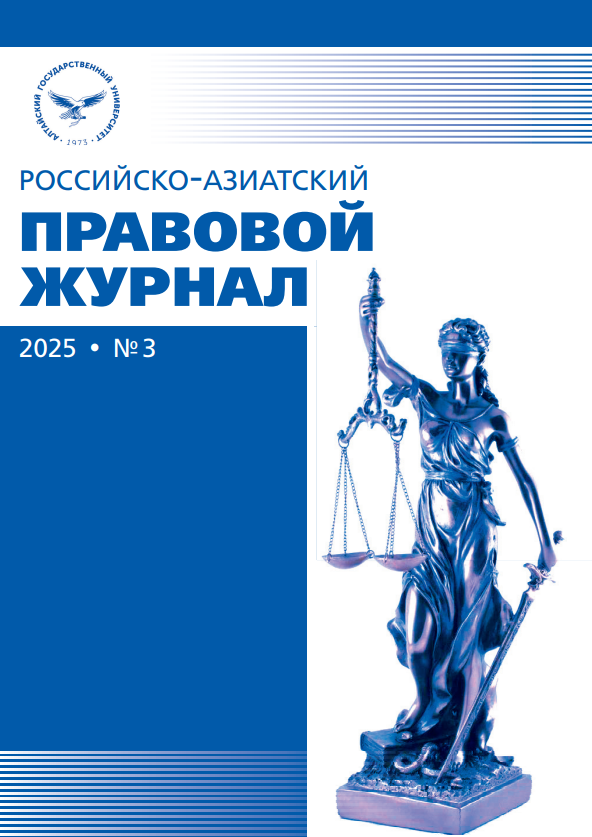TECHNOLOGICAL SOVEREIGNTY IN THE ERA OF POSTGLOBALIZATION
УДК 342.3 ББК 67.400.51
Abstract
The article examines the concept, essence and features of the formation of the concept of technologicalsovereignty in the context of the tense geopolitical situation that exists at present. The theories that contributeto the limitation of the sovereignty of individual countries in the era of globalization are considered. It is notedthat sovereignty is a complex concept that manifests itself in all spheres of life: political, social, spiritual andeconomic, and that one of the main aspects of the economic sphere at present is the technological aspect. It isindicated that due to the imposed theory of comparative advantages and the concept of free markets, whichoriginally arose in the countries of the Anglo-Saxon legal family, the problems of technological sovereigntyand technological security have not been developed in the countries of the former USSR for the last thirtyyears. Various interpretations of the concept of “technological sovereignty” in Russia and Western countriesare analyzed, and a conclusion is made about the correctness of defining technological sovereignty at thecurrent stage of Russia's development through the protection of national interests, the growth of the state's selfidentity, its independence from external influences while developing its own technologies, and not through adynamic equilibrium that characterizes the interdependence of states on each other.
Downloads
References
2. Макконнел К.Р. Экономикс: принципы, проблемы и политика: пер. с 13‑го англ. изд./ К.Р. Макконнел, С.Л. Брю. М. : ИНФРА-М, 1999. С. 25. 974 с.
3. Васильев А.А., Печатнова Ю.Е. Трансформация концепции государственного суверенитета в условиях глобализации // Российско-азиатский правовой журнал. 2019. №3. С. 86–89.
4. Ештокин С.В. Сквозные технологии цифровой экономики как фактор формирования технологического суверенитета страны // Вопросы инновационной экономики. 2022. Т. 12. №3. С. 1301–1314.
5. Концепция технологического развития на период до 2030 г. (утв. Распоряжением Правительства РФ от 20.2023 №1315‑р) // Собрание законодательства РФ. 2023. №22. Ст. 3964.
6. Couture S., Toupin S. What does the notion of 'sovereignty» mean when referring to the digital?URL: https://iorj.hse.ru/en/2020–15–4/416597980.html?ysclid=l9lrt9ipoa677038057 (дата обращения:21.10.2022). Цит. по: Янковская Е.С. Технологический суверенитет России: понятие, сущность, стратегия и пути ее реализации // Ученые записки Санкт-Петербургского им. В.Б. Бобкова филиала Российской таможенной академии. 2022. №4 (84). С. 76–81.
7. Космонавтика и технологический суверенитет России. 2013. URL: https://texnomaniya.ru/nauka/kosmonavtika-i-tekhnologicheskijj-suverenitet-rossii.html (дата обращения: 26.02.2025).
8. Аничкин Е.С. Правовое обеспечение технологического суверенитета России: современное состояние и резервы совершенствования // Российско-азиатский правовой журнал. 2024. №2. С. 12–16.
9. Суверенитет сначала в мозгах, а потом в технологиях // Электронный журнал «Стимул». 2022.URL: https://stimul. online/articles/interview/suverenitetsnachala-v-mozgakh-a-potomvtekhnologiyakh/(дата обращения: 26.02.2025).
10. Тимофеева А.Д. Технологический суверенитет: правовой аспект понятия на современном этапе регулирования // Молодой ученый. 2023. №21 (468). С. 350–352.
Copyright (c) 2025 О. Е. Зацепина

This work is licensed under a Creative Commons Attribution 4.0 International License.
Russian-Asian Law Journal is a golden publisher, as we allow self-archiving, but most importantly we are fully transparent about your rights.
Authors may present and discuss their findings ahead of publication: at scientific conferences, on preprint servers, in public databases, and in blogs, wikis, tweets, and other informal communication channels.
Russian-Asian Law Journal allows authors to deposit manuscripts (currently under review or those for intended submission) in non-commercial, pre-print servers such as ArXiv.
Authors who publish with this journal agree to the following terms:
- Authors retain copyright and grant the journal right of first publication with the work simultaneously licensed under a Creative Commons Attribution License that allows others to share the work with an acknowledgement of the work's authorship and initial publication in this journal.
- Authors are able to enter into separate, additional contractual arrangements for the non-exclusive distribution of the journal's published version of the work (e.g., post it to an institutional repository or publish it in a book), with an acknowledgement of its initial publication in this journal.
- Authors are permitted and encouraged to post their work online (e.g., in institutional repositories or on their website) prior to and during the submission process, as it can lead to productive exchanges, as well as earlier and greater citation of published work (See The Effect of Open Access).








